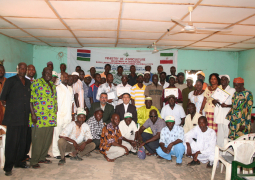The Gambia Investment and Export Promotion Agency (GIEPA), in collaboration with the Ministry of Trade, Regional Integration and Employment and the Social Development Fund on Tuesday ended a two-day national Micro, Small and Medium-scale Enterprise (MSME) development stakeholder’s forum.
The platform provided the participants the opportunity to discuss in detail issues relating to the policy environment, access to finance and business development services for the promotion of entrepreneurship and MSME development among others.
Deputy Permanent Secretary of Ministry of Trade, Regional Integration and Employment, Momodou Lamin Ceesay, said the development of MSME has been recognised the world over as an effective mechanism to facilitate economic development, as the sector plays a crucial role in providing fertile grounds for entrepreneurial potential to flourish.
“MSMEs are an essential source of jobs, creating entrepreneurial spirit and innovation, and are thus crucial for fostering competiveness and employment. Entrepreneurial activity within MSMEs, in a liberalised and globalised environment, allows business to respond quickly to dynamic market conditions,” he said.
He added that the MSME sector is also expected to increasingly play the role of a labour sponge in view of the declining trends in employment in the formal sector and the increasing urbanization of the developing countries.
It is estimated that in the next decade more than 90 percent of additional jobs in the urban areas in
Similarly, a significant proportion of the rural labour force will continue to depend on this sector for supplementing their incomes as well as for self-employment in the non-farm enterprises sector.
He said that like most countries in sub-Saharan Africa, the
This sector serves as a major source of employment and livelihood for the majority of the population of this country.
It is estimated that 60 percent of
Despite the significant contribution of the sub-sector and its unexpected potential that continues to face serious constraints, its main challenge is having assess to market for its goods and services.
Some of the problems of marketing range from access to market or difficulty in finding markets. There are instances where market for certain products may exist elsewhere in the country but the operators may not able to access it on account of lack of information concerning the marketing of their products.
He said that in recognizing the importance of the sector to national development, the government, through the Ministry of Trade, Regional Integration and Employment, formulated a national MSME policy and strategy with an action programme to support the development of the sector so as to enhance its contribution to national development.
“This policy provides a new institutional arrangement for the MSME support programmes at the level of government, which led to the creation of a specialised department of Enterprise Support and Development at GIEPA,” Mr Ceesay said.
For her part, Fatou Jallow, CEO of GIEPA, said as part of efforts geared towards attaining the inclusive growth, poverty reduction, employment and competiveness objectives of The Gambia as outlined in the national development Blueprint -Vision 2020 as well as the Programme for Accelerated Growth and Employment (PAGE), GIEPA, in collaboration with its partners, staged the forum to create broader understanding of the entrepreneurship and MSME environment as well as determining a way forward, especially with respect to the opportunities and challenges of the MSME sector.
According to her, GIEPA has been mandated to facilitate enterprise support and development and the agency has established a specialised department, which has commenced operations since August 2011.
GIEPA has conducted several key MSME development stakeholder engagements not only to obtain information on key interventions in the sector, but also to establish the implementation status of the five-year work programme of MSME policy and strategy document of November 2008, the GIEPA CEO said.
Findings of the pre-forum stakeholder engagements generally indicate that although there have been several interventions mainly in financing, business and entrepreneurship development services, such interventions have been made largely on ad-hoc, standalone and uncoordinated basis with instances of duplication of efforts.
MSMEs play a vital role in the socio-economic development in any nation, as they provide employment opportunities both in the rural and urban areas and also serve as an effective means of fighting poverty, reducing income inequality and providing the platform for entrepreneurship potential to flourish.
In addition it provides an opportunity to make a comprehensive assessment of the MSME environment and chart a way forward.
The forum also facilitated networking between MSME operators, policymakers and service providers.
Sonko B. Fofana, fund manager at Social Development Fund, pointed out that in The Gambia, like many other developing countries, the importance of MSMEs for economic growth and employment generation at relatively low capital cost has been recognised in the country’s development plans.
MSMEs form the mainstay of the country’s private sector, creating jobs and providing the tax base for local governments, which in turn provide revenue for the provision of essential social services.
He said the development of sustainable MSMEs therefore offers a good opportunity for breaking the cycle of poverty in The Gambia through wealth creation and employment.
The SDF’s interventions in support of entrepreneurship and MSME development in The Gambia came through the ADB-funded Entrepreneurship Promotion and Microfinance Development Project (EPMDP).




